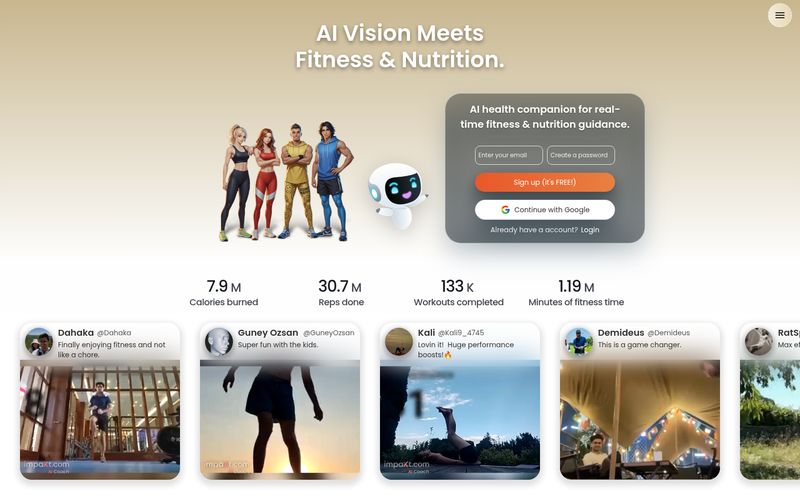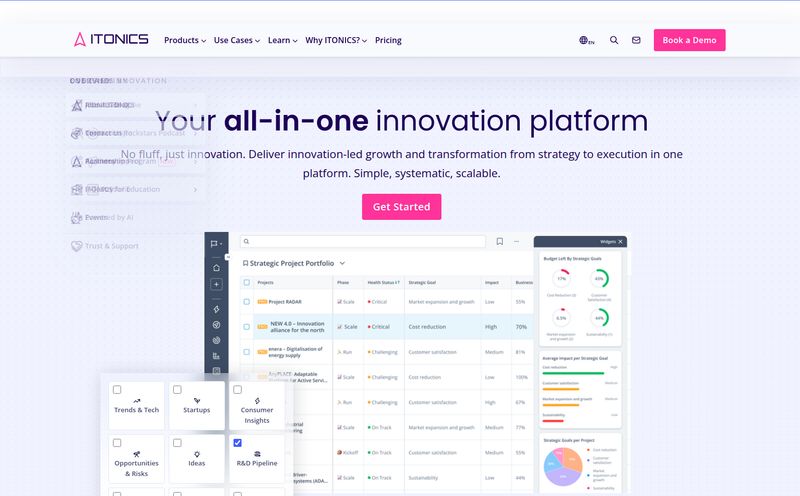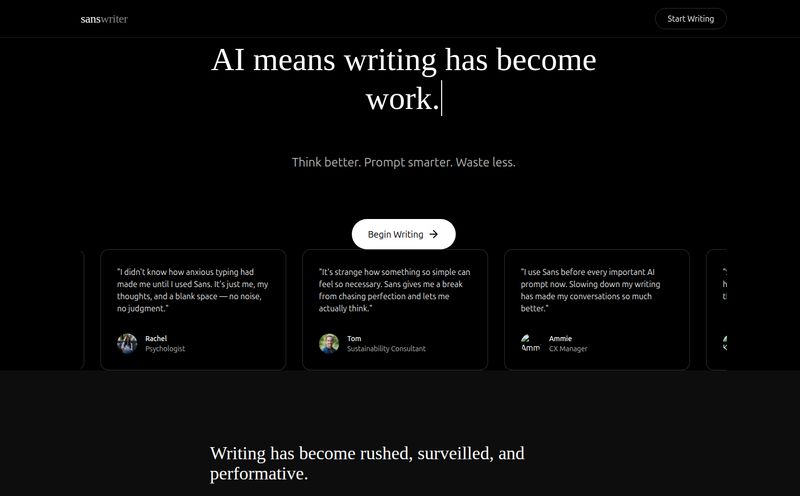I still have faint, stress-induced nightmares about my university finals week. Picture this: a desk buried under a mountain of textbooks, a rainbow of highlighter colors that somehow all ended up meaning 'important,' and a chaotic mess of sticky notes that had lost all their stick. My 'learning journey' was less of a journey and more of a frantic sprint through a blizzard with a poor map. It was organized chaos, leaning heavily on the chaos.
So when a new tool called Learning Copilot pops up on my radar, claiming to be an "AI learning copilot for students to manage & optimize their learning journey," my interest is definitely piqued. Part of me—the grizzled SEO and tech analyst—is immediately skeptical. The other part—the one that remembers chugging coffee at 3 AM—is genuinely excited. Could this be the digital sherpa we all needed for our academic Everest?
So, What Exactly is Learning Copilot?
From the looks of it, Learning Copilot isn't just another fancy calendar or to-do list app. It's positioning itself as an intelligent assistant. The core promise is built on two main pillars: AI-powered learning management and learning journey optimization. Sounds a bit like corporate buzzword bingo, I know. But let's try to break that down into something that makes sense for a student drowning in coursework.
I imagine it's designed to go beyond simple reminders. Instead of you just plugging in 'Study for History Midterm,' an AI like this would ideally help you structure how you study. It might analyze your syllabus, break down large topics into smaller chunks, and schedule focused study sessions for you. 'Learning journey optimization' suggests it might even adapt over time, maybe noticing you ace multiple-choice questions but struggle with essays, and then adjusting your study plan accordingly. A pretty big promise.

Visit Learning Copilot
The Real Potential of an AI Study Partner
Let's be optimistic for a moment. If Learning Copilot delivers on its potential, the benefits could be huge. We've all been there, feeling overwhelmed and not knowing where to even start. A tool that helps you manage your learning effectively is more than just a convenience; it's a mental health preserver.
Getting Your Academic Life in Order
The primary advantage I see is bringing order to the chaos. For students juggling multiple courses, part-time jobs, and maybe even a sliver of a social life, cognitive load is a real problem. Having an AI that intelligently maps out your schedule, reminds you of clashing deadlines, and helps you prioritize tasks could be a game-changer. It’s like having a personal assistant whose only job is to make sure you don't fall behind. The goal here isn't to be lazy, it's to be efficient. To spend less time stressing about what to do, and more time actually doing it.
A Personalized Path to Success
The 'optimization' part is where things get really interesting, and frankly, a bit futuristic. True optimization would mean the tool gets to know you. It would learn your peak productivity hours, the study techniques that work best for you (like the Pomodoro Technique), and the subjects you find most challenging. In theory, it could then suggest: "Hey, you seem to learn biology best in 25-minute bursts in the morning. Let's schedule that before your 11 AM class." This moves away from a one-size-fits-all approach to something truly customized. It's a far cry from my old paper planner, that's for sure.
Hold On, Let's Pump the Brakes a Little
Okay, the optimist in me has had his say. Now it's time for a dose of reality. As exciting as this all sounds, there are a couple of big, flashing warning signs for me. The first is the sheer lack of detail. The official descriptions are… well, brief. We're told what it does in a very high-level way, but not how. What does the interface look like? What specific algorithms does it use? Is it just a glorified scheduler with some AI branding? The vagueness makes it hard to assess its real power.
My biggest concern, though, is a philosophical one that the EdTech world is currently wrestling with. The official 'cons' even list this: a reliance on AI could hinder independent learning skills. And that’s the rub, isn't it? Learning how to manage your own time, how to break down complex projects, how to motivate yourself—these are skills you carry with you for life, long after you've forgotten the Krebs cycle. If an AI does all that heavy lifting for you, are you actually learning how to learn? Or are you just becoming an expert at following AI-generated instructions? I dont have a clear answer, and I suspect the developers of these tools don't either. It's the wild west of AI in education right now.
What's the Price of This AI Brainpower?
This is the million-dollar question, or perhaps the $9.99/month question. As of now, there's no public information on the pricing for Learning Copilot. This isn't unusual for a tool that's likely in its early stages. We could see a few possible models:
- A Freemium Model: Basic scheduling and management are free, with advanced AI optimization features behind a paywall. This is a classic SaaS approach.
- A Subscription Model: A flat monthly or annual fee for full access. Common for specialized productivity tools.
- An Institutional Model: Schools or universities pay for licenses for their entire student body.
My guess? It'll probably start with a freemium or generous trial period to get a user base, then introduce a premium subscription. But for now, your guess is as good as mine.
So, Who Should Be Keeping an Eye on Learning Copilot?
While any student could potentially benefit, I think the ideal user for a tool like this is a university student, especially those in demanding programs like engineering, medicine, or law. These are students who are constantly swamped with a high volume of complex information and tight deadlines. High school students might find it a bit overkill, but for a college kid trying to balance three advanced courses and a thesis, an AI copilot could be the difference between sinking and swimming.
Frequently Asked Questions
What is Learning Copilot in simple terms?
Think of it as a smart planner for your studies. It's an AI tool designed to help students organize their coursework, manage their time, and hopefully, create more effective study habits tailored to them.
How can an AI actually 'optimize' my learning?
In theory, by analyzing your subjects, schedule, and maybe even your performance over time, it can suggest the best times to study certain topics, break down big projects into manageable steps, and help you focus on areas where you're struggling.
Is Learning Copilot free?
The pricing hasn't been announced yet. It's possible there will be a free version or a trial, but many specialized AI tools eventually require a subscription for their best features.
Am I going to forget how to study on my own if I use this?
That's a valid concern. The key is to use it as a tool, not a crutch. Use it to handle the logistical stress so you can focus your mental energy on actual learning, but don't outsource your critical thinking or time management skills entirely.
Is this better than just using Google Calendar and a notepad?
It aims to be. While a calendar can tell you when an exam is, a tool like Learning Copilot wants to help you figure out how to prepare for it. The 'intelligence' is the main differentiator.
My Final Take on Learning Copilot
So, is Learning Copilot the future? Maybe. The concept is absolutely brilliant. It addresses a real, painful problem that students have faced for generations. However, the execution is everything. Right now, it's a promising idea wrapped in a bit of mystery.
I'm cautiously optimistic. I'll be keeping a close eye on this one, waiting for more details to emerge. If it can strike the right balance between helpful automation and fostering independent skill, it could truly revolutionize how students approach their education. If not, it'll be just another forgotten app. For now, it’s a fascinating glimpse into a future where maybe, just maybe, finals week doesn't have to be quite so terrifying.
Reference and Sources
- Information and general concept from the Learning Copilot platform description.
- Further reading on study techniques: The Pomodoro Technique by Todoist.
- Discussion on AI in Education: Edutopia's resources on technology integration.



